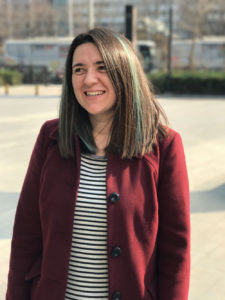A Life of Love for Education
The Chinese saying, 三岁看大,七岁看老 (Sān suì kàn dà, qī suì kàn lǎo), states the way someone behaves at three years old predicts the type of adult they will be in the future, while someone’s behavior at seven tells how they will be when they are elderly.
 Keren Wong, in a sense, personifies the adage. She has always shown an interest in education since she was a child, including playing teacher to her younger brother. It’s not surprising though, as Wong is inspired by her family, which loves education.
Keren Wong, in a sense, personifies the adage. She has always shown an interest in education since she was a child, including playing teacher to her younger brother. It’s not surprising though, as Wong is inspired by her family, which loves education.
After graduating college in 2012, Wong moved to Beijing to pursue a master’s degree in international development at Tsinghua University. Since then, she has co-founded Bridging Education and Mobility (BEAM), a Beijing-based educational organization that uses WeChat to provide materials and tutorials to rural primary teachers instructing grades three through six to increase their English phonics teaching performance.
“The interesting thing is that rural areas and lower-tier cities in China leapfrogged across PCs and desktops. So their entire online experience is on mobile,” the young entrepreneur said. By taking advantage of WeChat as a platform, Wong believes BEAM helps fulfill rural teachers’ needs in an accessible way.
On BEAM’s official WeChat subscription account, the organization gives access to step-by-step tutorials for classroom exercises, video tutorials, and advice blogs. But more than simply phonics materials, Wong realized that teachers needed a community of other educators to share ideas, so the organization made different WeChat groups, now serving 1,500 teachers and counting.
Currently, teachers discuss lesson plans and other classroom-related topics through comments on BEAM’s articles or through its WeChat groups. BEAM makes use of the app as a space for collaborative and cooperative learning, as teachers can draw from each other’s experiences through direct discussion, especially on topics like implementing new learning methods.
More than supporting teachers in their daily lives, Wong says she also hopes to show the world that China is innovating in its education landscape. For example, Boya Yang, a teacher in Yunnan Province, has been named one of the top ten finalists at the 2017 Global Teacher Prize. The award, hosted annually by the UK-based non-profit Varkey Foundation, recognizes outstanding teachers around the world. The winner of the prize gains recognition and an award of USD 1 million. Prior to this year, no Chinese teacher has ever risen higher than the prize’s top fifty educators.
It was Wong’s efforts that helped Yang reach the nomination, and ultimately, the finals. Wong said she realized that information about the award was not easily accessible to Chinese teachers when she browsed through the Global Teacher Prize website. So last year she initiated a local PR campaign and circulated a Chinese translation of the Global Teacher Prize competition information to teachers throughout China.
Wong hopes that more exposure for Chinese educators like Yang can give the world a more comprehensive understanding of China’s educational innovations, as well as the hardships that teachers can often face.
The inspiration for Wong’s work in the Chinese education system stems in part from her own family background. As a woman of Chinese heritage, Wong says that she wants to stand on stage and be proud of China’s accomplishments in the education sector. Wong recognizes that a lack of funding and resources in certain parts of China has left teachers to make tough calls especially when allocating available materials. However, she believes that China has much to look forward to in terms of educational innovation, since entrepreneurial spaces in the big cities are becoming more and more established.
Wong tells budding entrepreneurs to “spend time with your users and don’t make assumptions.” As for her own journey, it hasn’t been without struggles. In her five years in Beijing, Wong said she has developed an emotional fortitude. “As you get older you gain wisdom and understand that things are going to be fine. You learn to deal with crisis as an entrepreneur,” she said. Wong also attributes part of her organization’s success to being unembarrassed and being ready to face 30 or 40 rejections before getting that one sweet yes from clients and other contacts.
And that’s one thing that she said she would tell her younger self. “It’s only until you defy expectations that the status quo is changed.” Rather than letting fear lead the way, Wong is shaping the world in her own vision, helping teachers take the reins. While she may not be the kid-teacher handing out assignments to her brother anymore, her childhood passion for education has surely enlightened her adult pursuits.
Photos: Courtesy of Keren Wong and BEAM
Meet Other Beijing Community Pillars

-
 Rebirth after Childbirth: A doula’s experience of healing and helping other mothers
Rebirth after Childbirth: A doula’s experience of healing and helping other mothers“Since I was a child, I had always wanted to help the people surrounding me. It is my nature to be very empathetic.”
-
 Old Clothes, New Clothes: A movement that links expat women
Old Clothes, New Clothes: A movement that links expat women“It is the thought of women feeling disconnected that drives me. To be lonely in a place far from home is not a feeling I like to have…”
-
 Inspirational Talk: The vibrant volunteering life in Beijing that brings communities together
Inspirational Talk: The vibrant volunteering life in Beijing that brings communities together“And it’s such a desire to help others especially with so many things going on in the world at the moment.”
-
 Home of Strays: A community that finds solutions for animal welfare
Home of Strays: A community that finds solutions for animal welfare“Just seeing rescued animals in their new home makes me say, ‘I’m proud to have been a part.’”
-
 The Ecology of Functional Society: Valuing life systems in a polluted world
The Ecology of Functional Society: Valuing life systems in a polluted world“When you increase ecological function, the community becomes robust and resilient.”





